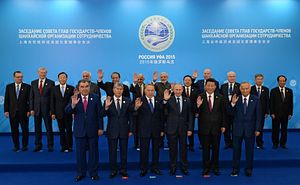Members, observers, and guests of the Shanghai Cooperation Organization (SCO) have gathered in Tashkent, Uzbekistan, for their annual summit. The multilateral organization concerns itself with the full kitchen-sink of topics–political, economic, security–but often seems to have little or no actual direction. The two-day summit will touch on the evergreen issues that plague the region: primarily security concerns stemming from Afghanistan and international terrorism. This summit, the organization’s 16th, may also see India and Pakistan join the group’s six present full members, its first expansion since Uzbekistan joined what had been known as the Shanghai Five in 2001.
Looking at the coverage of the summit from media in the various countries involved helps underscore the group’s amorphous nature. Certainly individual countries find different parts of the agenda more or less important, and the summit is not yet complete, but the focus has not been, by and large, on the SCO agenda. Instead the bilateral interactions that take place on the sidelines seem set to take precedence over whatever the group as whole may (or may not) achieve.
For example, take Indian coverage of Prime Minister Narendra Modi’s Tashkent trip. In India’s two largest English-language newspapers, The Times of India and The Hindu, coverage of Modi’s trip to Uzbekistan has focused heavily on the prime minister urging Chinese President Xi Jinping to support India’s entry into the Nuclear Suppliers Group (NSG)–not on the issue of India’s accession. Modi might be in Tashkent but India is thinking of Seoul, where the NSG is deadlocked over the question of whether to admit New Delhi into the powerful commercial club of nuclear states. The Hindu described the SCO as a “China-dominated grouping,” pointing to how New Delhi views its participation in the group.
Pakistani newspapers–like Dawn and The Express Tribune–seem to be largely ignoring the summit so far. The Express Tribune ran an article Wednesday about Pakistani President Mamnoon Hussain heading their delegation, but the piece lacks the exuberance of Dawn’s announcement last year that “Pakistan’s full membership to the powerful SCO was approved by its Council of Heads of State at its 15th Summit [in Ufa, Russia].”
Instead, there’s confusion about when India and Pakistan will actually join the organization. Xinhua, extolling the “Shanghai Spirit,” comments that India and Pakistan “are expected to join the Shanghai Cooperation Organization (SCO) as members during its 16th meeting” in Tashkent on June 23-24. But Russian narratives are more circumspect, with a Sputnik headline proclaiming “Russia Expects India, Pakistan to Become SCO Members in 2017” and one of Putin’s senior advisors commenting, as noted by Joshua Kucera for EurasiaNet, that “The process of accepting India and Pakistan into the SCO will enter the final stage and we expect that at the next summit in Kazakhstan, India and Pakistan will be finally admitted into the SCO ranks.”
Chinese and Russian media focus more on the SCO as a whole, but with emphasis on role of Beijing and Moscow in leading it. As soon as the SCO summit is over, Putin will be on his way to Beijing, and that looks to be a more important trip than the SCO summit.
Once the summit is over there’ll be news about the multilateral happenings, but anything more concrete than high-level, buzzword statements is unlikely. It looks like India and Pakistan are in a holding pattern with regard to full membership and the rest of the SCO (and guests of the summit) are busy trying to use the opportunity to settle bilateral issues: the Russians met with the Chinese and the Mongolians together; the Kyrgyz haven’t said who President Almazbek Atambayev is meeting but until recently his attendance was an open question, the Tajiks met with the Uzbeks and also with the Chinese.
Then there is Turkmen President Gurbanguly Berdimuhamedov’s attendance–as a “distinguished guest,” as Turkmenistan is neither a member nor an observer. Maybe Berdimuhamedov is in Tashkent to seek out the Chinese and discuss the delayed Central Asia-China Line D pipeline, or maybe he’s there just to listen in as Ashgabat contemplates the eroding meaning of “neutrality.”
In the end, the SCO will say it has furthered the cause of greater Eurasian cooperation and continues to make economic progress, building regional infrastructure and securing the continent from terrorists. But the Shanghai Spirit Beijing likes to conjure is a flimsy ghost.

































